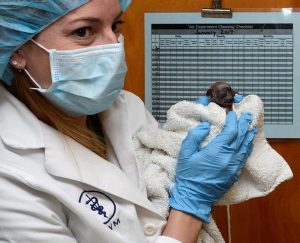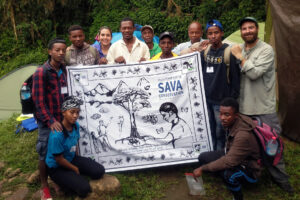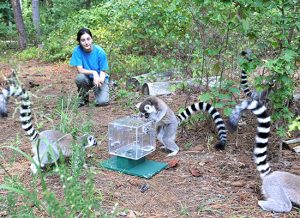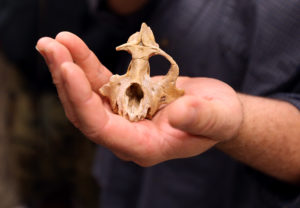Current Priority Needs for Special Gifts: $5,000 – $99,999
While unrestricted donations are always needed, appreciated, and directed toward priority needs of the DLC, these special targeted impact gifts are options for donors who are interested in a larger contribution between $5,000 and $100,000 and wish to restrict their gift toward a special priority need. Some of these opportunities of $15,000 or more can be divided into two or three annual payments to fulfill the total funding needed. Please direct questions to our development officer, Mary Paisley, at mary.paisley@duke.edu.
Funding Opportunities: Student and Volunteer Programs
Support an intern
Your gift of $8,000 or more will support the Lemur Center’s costs to provide a living wage + necessary fringes for one intern. Our internship program offers opportunities during the fall, spring, and summer for students to have hands-on experiences, exploring their interests in field research, animal husbandry, animal welfare, conservation education, or science communication.
Thus far, our approximately 20 students/year from across the U.S. have participated in unpaid internships. The addition of paid internship positions in 2022 made a great impact on our ability to enlist students who might not otherwise apply or participate.
Funding needed: $8,000 ($32,000 is desired to fund four positions) Update: Two intern positions are funded thanks to Wendy Baker and Jonathan Wilfong!
Intern and volunteer transportation cost reimbursement
Make a gift of $5,000 or more toward our expected expenses of more than $20,000 to transport student interns and volunteers to the center and back home during this fiscal year. Transportation is a barrier that could easily prevent a student from participating.
Funding needed: $5,000+ Fulfilled! Thanks to Wendy Baker and Jonathan Wilfong for their support!
Funding Opportunities: Animal Care
Top priority need: Ultrasound Machine
MARCH 2025: We just learned that our ultrasound machine is starting to fail. This piece of diagnostic equipment is an essential component in our medical arsenal. Routine exams, pregnancy confirmation, fetal monitoring and diagnosing disease and injury all rely on excellent ultrasound imagery. We are asking your help to purchase this critical equipment so that we can maintain the excellent medical care we give our lemurs.
Funding needed: $37,000 and this can be paid within four years
New Electric Pick-up Truck: $80,000
The Duke Lemur Center would very much appreciate a gift of $80,000 in the coming year to allow us to purchase new and very much needed utility vehicles for our daily work on our 100 acre campus. Our pickup truck enables us to transport supplies, materials, and even the members of our priceless colony (in their kennels, of course!) of more than 200 lemurs. Our truck plays an integral role in our work to protect and care for our colony, to provide expert veterinary care, and to engage lemurs, scientists, and students in our expanding and exciting non-invasive research and education programs. With this donation, the Duke Lemur Center would purchase a new electric Ford Lightning F150 Truck plus the installation of a charging station.

Handheld Two-Way Radios
The DLC relies heavily on Motorola handheld radios to stay in contact with each other and to convey critical information in a timely manner to anyone of our employees, volunteers, and interns on our 80+acre site. Our radios consist of three different models, of which two models are no longer available or supported by Motorola. We have 73 working radios of which we need to replace 40 with the hope of increasing our fleet by 20 more to ensure coverage with interns and volunteers. Motorola Mototrbo R7 model is the current supported model in the fleet. The cost is $1,600 per unit.
Funding needed: $64,000 for all 40 radios, or multiple $5,000+ donors to allow us to purchase 3+ units at a time
Addition of improved housing for our small nocturnal prosimians
Revised housing for our dwarf lemurs, mouse lemurs, and bush babies is needed to provide them with more varied space, and the ability to house larger family groups together. This adaptive housing is optimal for our nocturnal species, who can’t free range in the forests, like their diurnal counterparts.
Funding needed: $26,000
Special animal enrichment supplies
Providing for the mental well-being of every animal is the focus of our enrichment program and is just as important as a proper diet and safe habitat.
Funding needed: $5,000 Fulfilled! Thanks to Wendy Baker and Jonathan Wilfong for their support!
Animal camera project
New cameras and maintenance of existing cameras allow our staff to check on animals at any time of day or night. For animals like our aye-ayes, who are experiencing their new outdoor enclosures for the first time, these cameras are critical to monitoring their safety and documenting their reaction to a brand-new world.
Funding needed: $16,000 Fulfilled! Thanks to MJ Chapman and Kathleen MacDonald for their support!
Funding Opportunities: Madagascar Programs – SAVA Conservation
The opportunities below are priority needs that are restricted gift options over $5,000 for this fiscal year. We would like to recognize the significant contributions to Madagascar Conservation from Darren and Julie Harkness Cooke, Bob and Sue Knox, Sharon and Preston Boggess, and Wendy Baker and Jonathan Wilfong, who are currently funding a number of our specific programs in Madagascar. We’re also fortunate to receive grants from General Mills, Inc., Re:wild, McQuade Foundation, The Duke Endowment, the Duke Africa Initiative, Duke Bass Connections, the Triangle Center for Evolutionary Medicine, the Nashville Zoo, and more! We rely entirely on private donations and grants to fund our programs in Madagascar.
Empower a Malagasy scientist to earn advanced degree
Opportunities for higher education are limited for students in Madagascar, making scholarships for Malagasy graduate students vital to complete their Masters and PhD degrees. The DLC SAVA Conservation Initiative engages graduate students from the regional universities in research and conservation. Four graduates from SAVA are now pursuing advanced degrees with our technical and financial assistance. Your support will fund a student’s tuition, a modest cost-of-living stipend, transportation to and from the other regions, a personal laptop and informatics training, and field research focused on conservation.
Funding needed: $20,000 per student for 3 years to complete their degrees
Empowering Malagasy students in science sovereignty
Training and empowering Malagasy scientists is fundamental to sustainable research and conservation. Malagasy students rarely have funding opportunities to conduct research as students. We have partnerships with the universities in northern Madagascar to support their students conducting independent research projects. We collaborate with university administration to host workshops in research design and analysis; to pair students with faculty mentors; and to lead a competitive research grant program. Through this project, dozens of students have strengthened their capacities to conduct research and complete their degrees.
Funding needed: $20,000 for one year
Environmental Education Training Camp
Our partner and SAVA educator Evrard BENASOAVINA created an interpretive center which he calls the New Generation School Garden. Evrard teaches children and adults the value of the environment and new farming practices that reduce environmental impacts. With your support, we will host six schools and almost 400 students for week-long environmental education training camps.
Funding needed: $13,800 Fulfilled! Thanks to Wendy Baker and Jonathan Wilfong for their support!
Field trips to Marojejy National Park
We offer field trips for Malagasy students to one of the most iconic national parks in northern Madagascar, recognized as a UNESCO World Heritage Site. Student groups spend four days camping in the forest in search of lemurs and learning about the unique biodiversity found only in their country. Your support will give six school groups (120 students) the opportunity to experience their unique natural heritage first-hand.
Funding needed: $10,500 Fulfilled! Thanks to Wendy Baker and Jonathan Wilfong for their support!
Fuel-efficient stoves project
Support our research and development on fuel-efficient stoves for cooking with charcoal and firewood. Nearly all people in SAVA cook with charcoal or firewood, often on open fires that are not fuel-efficient. We have partnerships with a local NGO to obtain high-quality fuel-efficient stoves that greatly reduce fuel use compared to traditional stoves. We will conduct information campaigns and distribute stoves to 1,000 households and conduct follow-up surveys.
$5,000+ ($30,000 needed/$5,000 received t0-date & $25,000 to go!) Thanks to Wendy Baker and Jonathan Wilfong for their support!
Educational video series
To expand our public outreach both in Madagascar and the U.S., we collaborate with a Malagasy videographer to produce short videos highlighting the DLC-SAVA projects and how each activity contributes to conservation and development. The videos, produced in Malagasy and English, will be used by our Malagasy team to disseminate our activities more broadly and on our online platforms to share our progress with the broader community.
Funding needed: $7,500 Fulfilled! Thanks to Wendy Baker and Jonathan Wilfong for their support!
Project vehicle
As the DLC’s programs in Madagascar diversify and our team grows, so do our logistical needs. Our team and projects have grown such that we need a second vehicle for our teams to split up and cover more ground every day, reducing inefficient costs associated with renting vehicles.
Funding needed: $50,000
Funding Opportunities: Non-harmful Research
Field Metabolic System
A field metabolic system is a portable machine we can use to analyze the breath of lemurs to quantify their oxygen consumption, a proxy for metabolic rate. This piece of equipment will help to take the DLC’s Hibernation Research Program to the next level, both at the DLC and in Madagascar.
Funding needed: $27,000
A quantitative PCR machine and accessories
A qPCR (quantitative PCR) machine would give the DLC a powerful tool for analyzing DNA variants, gene expression, and microbial species diagnostics in captive and wild lemurs. With qPCR, researchers can quickly and accurately quantify DNA or RNA from lemur samples, providing precise genetic analysis to gain insights into reveal genetic diversity, genotypes relevant to lemur traits of interest, and microbial load in individual animals, which is valuable for understanding population structure, linking phenotypes to their genetic bases, and monitoring health.
Funding needed: $20,000
With a CO2 incubator we would be able to grow cells and use them as a non-invasive way to study different physiological processes in vitro.
Funding needed: $18,000
ATS Receiver-Datalogger
This piece of equipment is critical to the DLC’s Hibernation Research Program, both at the DLC and in Madagascar. The receiver-datalogger reads the frequencies of the temperature-sensitive radio collars and converts the pattern of pings to temperature, allowing us to monitor dwarf lemurs’ body temperature; this is especially important to monitor during their hibernation season so that we can determine, in real time, when they are in a deep torpor bout and when they are in their sleep phase.
Funding needed: $6,000
Cell counter
A cell counter would allow us to accurately quantify the density of cells in solution.
Funding needed: $5,000
Transilluminator (gel imaging system)
This piece of equipment is necessary for genomic research conducted at the DLC, specifically for visualization of target DNAs and proteins after electrophoresis. UV transilluminators are used in molecular biology laboratories to view DNA or RNA that has been separated by electrophoresis through an agarose gel. Exposing the stained gel to a UV light source causes the DNA to fluoresce and become visible.
Funding needed: $8,000
Lyophilizer, including accessories
To freeze-dry fecal and plant samples for downstream analyses (hormones, biomarkers, etc.). For in-house use as well as for external researchers, as it would be easier to ship and store dried rather than fresh samples.
Funding needed: $20,000
Ultracold freezer
This freezer is needed for the preservation of invaluable biological samples collected non-invasively during veterinary procedures and made available for scientific research (genomics, immunology, endocrinology, metabolomics, etc.). We need two freezers. The price is for each unit.
Funding needed: $15,000 for one unit or $30,000 for both units
Scientific freezer
Needed for the preservation of cadaveric specimens made available for scientific research (anatomy, biomechanics, ontogeny, etc.). All DLC animals continue to contribute to research, even beyond their natural lifespan. We need two units. The price is the cost for a single unit.
Funding needed: $10,000 for one unit or $20,000 for both units
Madagascar Research Initiatives
Research Leadership Exchange
Provide an opportunity for one Malagasy leader in lemur science and conservation to participate in a priority research activity at the DLC, Duke University, and/or the Durham community. Funding will cover an individual’s participation in 1 to 2 weeks and/or 2 to 3 presentations/roundtables offering opportunities for meetings, brainstorming, and/or grant writing; and covers international airfare, hotel, speaker fees, event fees.
Funding needed for one participant: $6,000 Fulfilled! Thanks to Wendy Baker and Jonathan Wilfong for their support!
Funding Opportunities: Museum of Natural History
MicroCT scanning
Our scanning operations are crucial as we race against the elements to create a digital, 3D record of our collection before the North Carolina weather gets the better of it. Traditional paleontology was based on collections visits. Researchers would need to physically visit a collection to examine the specimens. Specimens could also be loaned, but that meant only one person or team could work with a fossil at a time. Researchers also needed to know the collection existed in the first place.
Funding needed: $17,000 to cover a full year, or $8,500 to cover six months
Memorial and Dedication Gifts
5” x 3” plaque on a bench – remains on-premises for the life of the bench–$15,000.
$25,000+ permanent onsite plaque options, contact Mary Paisley at mary.paisley@duke.edu or 919.401.7252 for more information.
Additional Options
If you are interested in finding a special purpose for a gift ranging from $5,000 to $99,000, the Duke Lemur Center is happy to discuss with you our current priority needs and options for your gift to make a significant impact. Please contact our development officer, Mary Paisley, at mary.paisley@duke.edu or 919.401.7252. For information about gifts of $100,000 or more, please visit our Major and Principal Gifts page.





